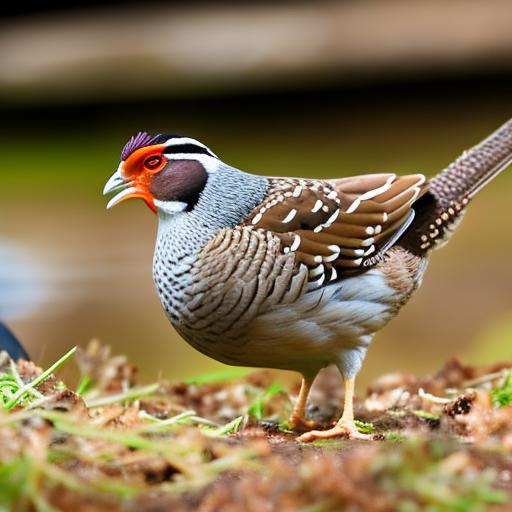Keeping Japanese quail with chickens can be a rewarding experience for poultry enthusiasts. Japanese quail, also known as Coturnix quail, are small, ground-dwelling birds that are native to East Asia. They are popular for their small size, gentle nature, and ability to lay a large number of eggs. Chickens, on the other hand, are larger birds that are also prized for their egg-laying abilities and are often kept for meat production as well. When kept together, Japanese quail and chickens can complement each other in terms of egg production and pest control. However, it is important to understand the specific needs of both species in order to successfully keep them together. This article will provide an in-depth look at the considerations for keeping Japanese quail with chickens, including their housing, feeding, health management, and social dynamics.
Key Takeaways
- Japanese quail can be successfully kept with chickens, but it’s important to understand their specific needs and behaviors.
- Both Japanese quail and chickens require proper housing, including separate areas for nesting and roosting.
- Feeding and nutrition for Japanese quail and chickens should be carefully balanced to meet their individual dietary requirements.
- Regular health checks and disease management are crucial for maintaining the well-being of both Japanese quail and chickens.
- Managing social dynamics between Japanese quail and chickens requires careful observation and intervention to prevent aggression and ensure harmonious cohabitation.
Understanding the Needs of Japanese Quail and Chickens
Japanese quail and chickens have different needs when it comes to housing, feeding, and social dynamics. Japanese quail are ground-dwelling birds that prefer to have access to open space for foraging and dust bathing. They are also sensitive to extreme temperatures and require protection from harsh weather conditions. Additionally, Japanese quail are known for their high egg production, so they require nesting boxes or areas where they can lay their eggs in peace. Chickens, on the other hand, are more adaptable to different housing setups and can thrive in a variety of environments. They are also more social animals and tend to form hierarchical structures within their flock. Chickens also have specific dietary requirements and need access to a balanced diet that includes grains, protein, and calcium for egg production. Understanding these differences in needs is crucial for creating a harmonious environment for both Japanese quail and chickens.
Coop and Housing Considerations for Japanese Quail and Chickens
When keeping Japanese quail with chickens, it is important to provide a suitable coop and housing setup that meets the needs of both species. The coop should have separate areas for the quail and chickens to roost and lay eggs, as well as communal areas for feeding and foraging. For the quail, providing low roosting areas and plenty of ground space for dust bathing is essential. Additionally, nesting boxes should be provided for the quail to lay their eggs in a quiet and secluded area. For the chickens, roosting bars at varying heights can help establish a pecking order within the flock, while nesting boxes should be easily accessible for egg collection. The coop should also be well-ventilated and provide protection from predators and extreme weather conditions. Providing ample space for both species to move around freely is important for their overall well-being.
Feeding and Nutrition for Japanese Quail and Chickens
Feeding and nutrition are crucial aspects of keeping Japanese quail with chickens. Both species have specific dietary requirements that need to be met in order to maintain their health and productivity. Japanese quail require a high-protein diet to support their egg-laying capabilities, so a commercial game bird feed or a mix of grains and seeds can be provided. Additionally, offering crushed oyster shells or calcium supplements can help ensure strong eggshells for the quail. Chickens also require a balanced diet that includes grains, protein, and calcium for egg production. A commercial layer feed or a mix of grains and pellets can be provided to meet their nutritional needs. It is important to monitor the feeding habits of both species to ensure that they are getting enough food without overeating. Providing access to fresh water at all times is also essential for both Japanese quail and chickens.
Health and Disease Management for Japanese Quail and Chickens
Maintaining the health of Japanese quail and chickens is essential for successful cohabitation. Both species are susceptible to various diseases and parasites that can impact their well-being. Regular health checks and monitoring for signs of illness are important for early detection and treatment. Additionally, providing a clean living environment with proper ventilation and sanitation practices can help prevent the spread of diseases. Quarantining new birds before introducing them to the existing flock can also help prevent the transmission of diseases. It is important to consult with a veterinarian or poultry health expert to develop a health management plan that addresses the specific needs of both Japanese quail and chickens. By staying proactive about health management, poultry enthusiasts can ensure the well-being of their birds and minimize the risk of disease outbreaks.
Managing Social Dynamics between Japanese Quail and Chickens

Understanding the social dynamics between Japanese quail and chickens is important for maintaining a harmonious flock. Chickens are known for their hierarchical structure within the flock, with dominant individuals establishing pecking orders. When introducing Japanese quail to an existing chicken flock, it is important to monitor their interactions to ensure that they are not being bullied or excluded from resources such as food and water. Providing multiple feeding and watering stations can help prevent competition between the two species. Additionally, providing ample space for both species to move around freely can help reduce aggression and territorial behavior. It is also important to monitor the overall well-being of the flock and intervene if any signs of stress or aggression are observed. By understanding the social dynamics between Japanese quail and chickens, poultry enthusiasts can create a peaceful cohabitation environment for both species.
Tips for Successfully Keeping Japanese Quail with Chickens
Keeping Japanese quail with chickens can be a rewarding experience when done thoughtfully and responsibly. By understanding the specific needs of both species in terms of housing, feeding, health management, and social dynamics, poultry enthusiasts can create a harmonious environment for their birds. Providing suitable coop and housing setups that meet the needs of both species, offering a balanced diet that meets their nutritional requirements, staying proactive about health management, and understanding the social dynamics between Japanese quail and chickens are all essential aspects of successfully keeping them together. With proper care and attention to detail, keeping Japanese quail with chickens can result in a thriving flock that provides both eggs and companionship for poultry enthusiasts.
If you’re considering keeping Japanese quail with chickens, it’s important to provide suitable housing for both species. A well-designed chicken coop can accommodate both chickens and quail, ensuring they have enough space and protection. For some great ideas on chicken coop designs, check out this article on large chicken coop ideas. It offers valuable insights into creating a comfortable and functional living space for your poultry.
FAQs
What are the benefits of keeping Japanese quail with chickens?
Japanese quail can help control pests in the chicken coop, such as ticks and mites. They also provide additional eggs and can help with overall flock health by adding diversity to the environment.
What are some considerations when keeping Japanese quail with chickens?
It’s important to consider the space requirements for both the quail and chickens, as well as their dietary needs. Additionally, quail may be more susceptible to diseases carried by chickens, so biosecurity measures should be in place.
What are the housing requirements for keeping Japanese quail with chickens?
Quail and chickens should have separate living spaces within the same coop or run to prevent aggression and ensure each species has access to their specific needs. The quail area should have smaller wire mesh to prevent escape.
What should be considered regarding the diet of Japanese quail and chickens when kept together?
Quail and chickens have different dietary requirements, so it’s important to provide separate feeders for each species. Additionally, the quail may require higher protein levels in their diet compared to chickens.
Are there any potential issues with keeping Japanese quail with chickens?
Aggression between the quail and chickens can be a potential issue, so it’s important to monitor their interactions and provide enough space for both species. Additionally, disease transmission between the two species should be considered.
Meet Walter, the feathered-friend fanatic of Florida! Nestled in the sunshine state, Walter struts through life with his feathered companions, clucking his way to happiness. With a coop that’s fancier than a five-star hotel, he’s the Don Juan of the chicken world. When he’s not teaching his hens to do the cha-cha, you’ll find him in a heated debate with his prized rooster, Sir Clucks-a-Lot. Walter’s poultry passion is no yolk; he’s the sunny-side-up guy you never knew you needed in your flock of friends!







